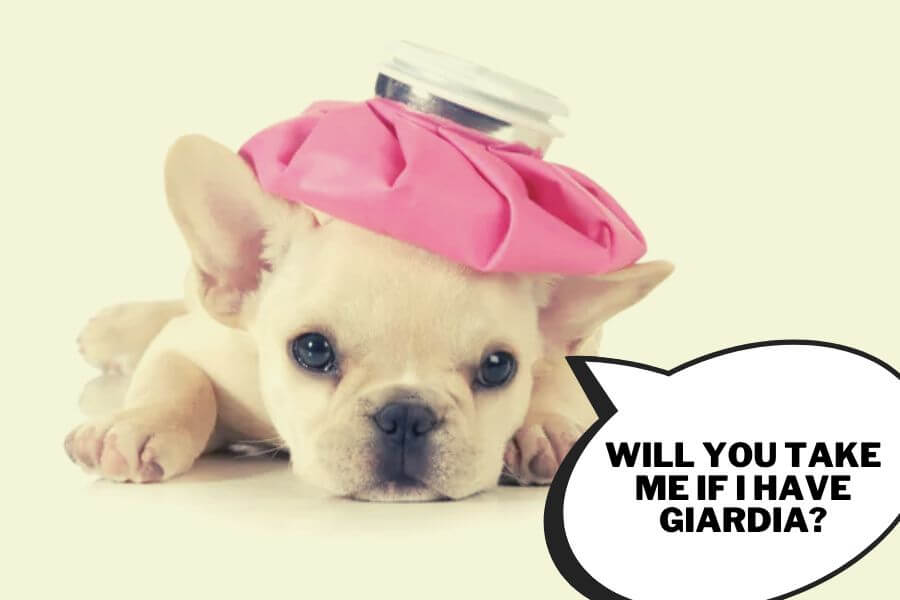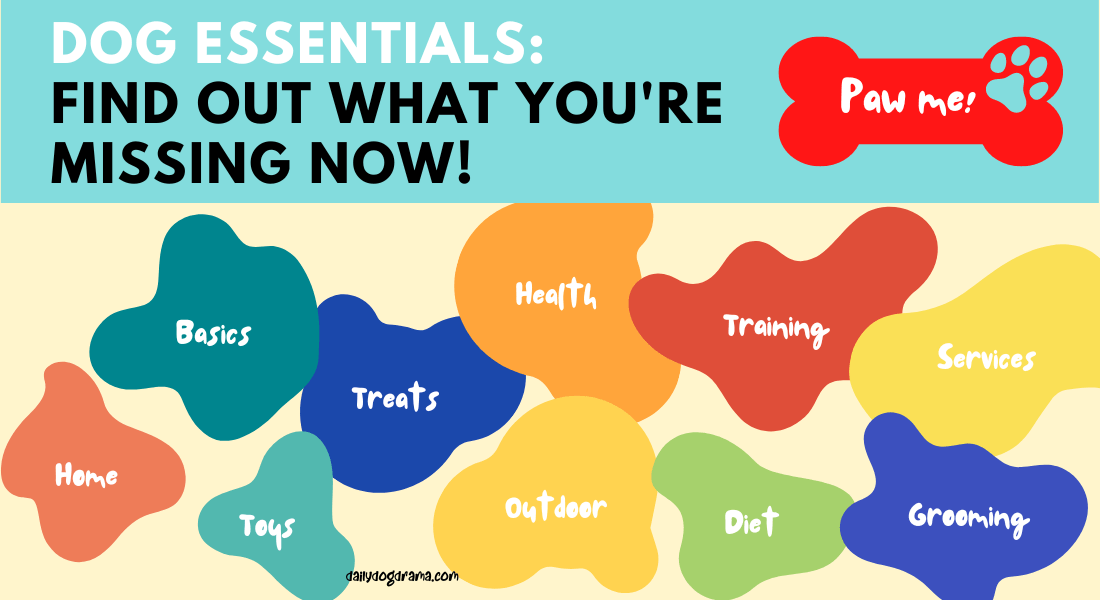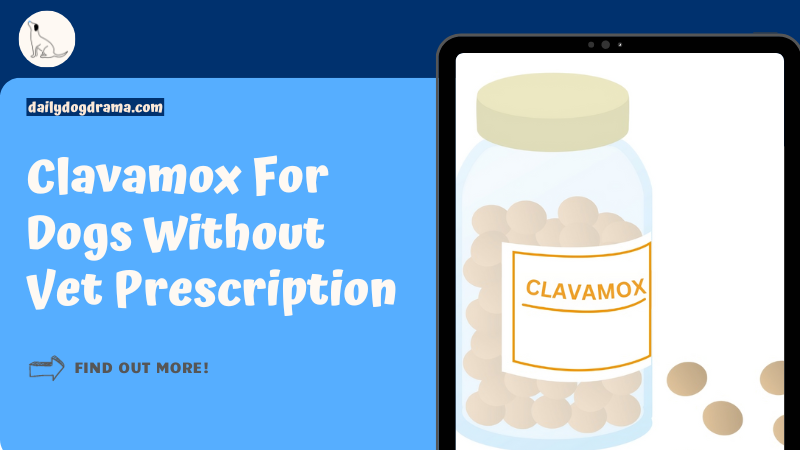Do you know what DOG ESSENTIALS you are missing out? Find out now!
Zack Keithy, our author, is a certified veterinarian technician (UC Blue Ash) for over 6 years (contact him here). The articles written here are based on his expertise and experience, combined with a review by our expert vet reviewers including Dr M. Tarantino. Learn more about us here.
You’ve probably heard of Giardia before, but you might not know what it is. It’s a parasite that affects puppies and dogs of all ages.
Giardia is spread through contact with fecal matter, or through contact with food or water that has been contaminated.
These parasites often cause diarrhea and other gastrointestinal problems like nausea, vomiting, stomach cramps, and excessive gas, and in some cases could even be fatal.
So what should you do if your puppy got giardia from a breeder?
Let’s find out more.
Medical Questions? Talk to a Veterinarian 24/7.
Connect one-on-one with a licensed vet who will answer your questions in minutes.
*Article may contain affiliate links to retailers like Amazon and Chewy. Learn more on our disclosure page.
- What is Giardia?
- Which Countries are Giardia Commonly Found?
- Causes of Giardia in Dogs
- What Does Giardia Do To Dogs?
- Symptoms of Giardia in Dogs
- How to Diagnose Giardia in Puppies?
- Treatment for Giardia in Dogs
- How to Prevent Dogs From Getting Giardia?
- Is Giardia Contagious to Humans?
- Is Giardiasis Contagious to Other Animals?
- Giardia: What is Fair to Expect from Breeders?
- Should a Breeder Contract Exclude Giardia?
- Frequently Asked Questions (FAQs)
- Would You Still Buy a Puppy That Had/has Giardia?
- In Conclusion: Puppy Got Giardia From Breeder
What is Giardia?
Giardiasis is a microscopic parasite that can be found in dogs and humans alike. It causes diarrhea in pets and may cause serious health problems in humans.
Dogs become infected when they ingest Giardia, which can be found in contaminated water or other substances.
Most pet owners aren’t aware of this parasite because it may show symptoms until after six months of age.
However, when symptoms appear, they’re often mistaken for those of another common intestinal disease called parvovirus.
Doggy says, read this too:
Which Countries are Giardia Commonly Found?
The parasite Giardia is found in many parts of the world, and more so in places with poor sanitation, such as developing countries with poor access to clean water or sanitation systems.
In developed countries like the United States, where access to clean water and sanitation systems are relatively common, Giardia is usually found in animals like dogs or cats that have come into contact with infected feces from humans or other animals.
Doggy says, consider reading this too: Why is My Dog’s Tongue Blue?
Causes of Giardia in Dogs
Here are some possible ways that your dog could be exposed to Giardia:
- Drinking contaminated water, especially if it has not been treated with chlorine or other disinfectants
- Eating fecal matter from another dog or person (this can happen if you do not clean up after your pets)
- Swallowing food or water that has been used by other animals such as cats and rodents
- Eating grass or other vegetation that has come into contact with infected feces
Doggy says, consider reading this too: Can You Bury a Dog That Died of Parvo? [+3 Alternatives]
What Does Giardia Do To Dogs?

Giardia in dogs is not always a problem, but when it is, it is extremely unpleasant.
The parasite interferes with your dog’s ability to absorb nutrients, water, and electrolytes, resulting in diarrhea and weight loss.
Diarrhea can be intermittent or continuous, particularly in puppies, and failure to diagnose and treat the disease can result in severe weight loss and, in extreme cases, death.
Puppies, senior dogs, and dogs with compromised immune systems are especially vulnerable to the disease.
Doggy says, you might like this too: Pros and Cons of Getting a Third Dog [Broken Down]
Symptoms of Giardia in Dogs
The symptoms of Giardia in dogs include:
- vomiting and diarrhea, which may be bloody or contain mucus
- weight loss
- a poor appetite
- lethargy (tiredness)
- frequent urination with small amounts of urine
- stomach bloating and passing gas frequently
- coat appearance changing
Among the more common symptoms of giardiasis in puppies are indigestion, refusal to eat, decreased energy levels, and a swollen tummy from gas and bloating.
If the infection persists, a puppy may have difficulty gaining or maintaining weight, as the parasite compromises its ability to properly process food.
How to Diagnose Giardia in Puppies?
The first step is to take a stool sample from your puppy and send it to your vet for testing and to rule out other common bacteria such as campylobacter and coccidia.
They will be able to tell you what they find in the sample, whether it’s giardia (presence of protozoan) or not.
If it is giardia, then you can work with your vet on how best to treat it so your puppy doesn’t get sick again.
The vet may also perform other tests to determine if there are other parasites in his system or if there are other possible causes for his symptoms.
Treatment for Giardia in Dogs
Fenbendazole and metronidazole are the most commonly used drugs to kill Giardia.
To treat giardiasis, these medications are typically administered for three to ten days, and in some cases, both drugs are given together.
During treatment, your vet is also likely to recommend that you change your dog’s diet to a highly digestible one that may help reduce loose stools.
Depending on their condition and the severity of the infection, some dogs may require additional tests and treatments.
Take note that if your puppy has giardia and has recovered, it will still need to be re-tested two to four weeks after treatment is completed.
Did you know why dogs throw up after taking medicine?
How to Prevent Dogs From Getting Giardia?

If you want to keep your dog from coming down with the disease, the key thing is to restrict it from drinking out of unknown water sources such as puddles, ponds, or just about anywhere.
When there is no exposure, the risk of your puppy getting infected is next to zero.
Here are a few other tips that can be useful:
- Wash your hands after handling your dog’s poop, and before handling food for yourself or anyone else. Even if you don’t see any signs of diarrhea, you should still wash up after handling your dog’s poop
- Keep the yard clean by picking up dog poop as soon as possible after it falls on the ground. If you’re using a compost bin, make sure to empty it into another container that doesn’t sit in your yard (like an old plastic bin) so that dogs don’t have access to it when they go outside
- Keep water bowls clean at all times! Dogs will often drink out of dirty water bowls—this is how they get sick with Giardia! Make sure to dump out water bowls regularly and wash them with soap and water whenever they’re dirty or have been in contact with other animals’ saliva/poo/pee
Is Giardia Contagious to Humans?
Dog and cat poop can contain Giardia germs, which can make people sick even if the pet seems its normal self.
There is a likelihood that your dog might pass giardia to you, for example when handling feces, but the chances are very low.
The Giardia strain that infects humans is not always the same strain that infects dogs and cats.
Is Giardiasis Contagious to Other Animals?
Giardiasis is highly contagious and can be transmitted to other animals through direct contact with infected dogs or cats.
With regards to other animals, there is still a likelihood of spreading to them, but there is not a lot of knowledge about this topic yet.
Giardia: What is Fair to Expect from Breeders?
If you realize your puppy has giardia after bringing it back from a breeder, you should expect that the puppy will need to be treated for the parasite.
In fact, it is the responsibility and duty of a breeder to ensure that when they hand over the puppy to you, it should be in the best shape possible.
Breeders spend a lot of time with them and part of their job is to monitor newborns for any signs of trouble.
If they neglect to act on it and “deceive” you into receiving the puppy, they need to be held responsible.
From a dog owner’s point of view, I think you should request for your breeder to send the puppy for treatment and keep you updated on the progress, rather than hoping you don’t realize it till it is too late.
The good news is that giardia can be treated with a course of antibiotics, and once your puppy has been treated, it should be fine and not show any more symptoms.
You should do what you can to prevent your puppy from getting sick in the future by practicing good hygiene around the home.
This means cleaning up after yourself and your pets, keeping the litter box clean and sanitized, and keeping your yard free of waste so that germs don’t get spread around.
Should a Breeder Contract Exclude Giardia?
In general, breeder contracts usually don’t specifically exclude parasitic issues such as giardia, and I personally do not think it is fair too.
There is no way for the breeder to control what a puppy might stick its tongue into after leaving the premises. so to have such a clause seems pretty unreasonable.
That said, there should be health guarantees in place to cover major issues such as underbites, joint problems, or any other issues that are a result of improper breeding (such as breeding half-siblings dogs).
Also, there is likely a short period after collection (usually 3 days) where you as a dog owner can bring your new pet to a vet of your choice to have it checked out.
On your part, you should also have visited the breeder and observed how they operate, especially with regards to safety, hygiene, and the overall condition of the dogs there.
If there are any signs that make you uncomfortable, I would recommend staying away and finding an alternative instead.
Frequently Asked Questions (FAQs)
What Percentage of Puppies Have Giardia?
Giardia is common, and dozens of studies have been conducted to determine its prevalence in dogs. In some populations, the prevalence can reach 45% or higher, with specific outbreaks in kennels affecting the majority of the dogs present.
Is Giardia Common in New Puppies?
Yes, giardia is common in puppies. Because it can be transmitted to healthy animals through feces from an infected animal’s body, it is common in situations where many dogs can be found at once, such as in dog parks, breeders, kennels, and vet offices.
How Long Does It Take for Giardia to Show Up in Puppies?
In dogs, the time between ingestion of cysts and passage in feces is 5 to 12 days.
Does Giardia Ever Go Away in Puppies?
Yes, it does. Even though it can be challenging to totally eradicate giardia and prevent reinfection, the infection is often cleared after just one round of treatment.
Would You Still Buy a Puppy That Had/has Giardia?
This is really too subjective of a question to answer, and I personally do not think there is any right or wrong answer to it.
There are some long-term effects of having giardia, including inflammatory bowel disease that can be a real struggle to deal with.
The treatment for giardia uses antibiotics, which can be detrimental to a puppy’s growth and present other potential problems in the future, so undertaking ownership of an infected dog is a seriously huge responsibility.
With all things being equal, I would probably skip over this lot and wait for a new batch of puppies.
In Conclusion: Puppy Got Giardia From Breeder
I know this is a very long article and quite a lot to digest, but I hope that this article has helped you understand a better picture.
Sometimes, a puppy getting giardia from a breeder might not immediately be the breeder’s fault, and if they are willing to provide recovery actions, they are still worth working with.
Being a dog parent is tough, and that is why we have written lots of useful articles to help you out such as understanding why your dog shakes its head while barking, what to do if your dog ate Ativan, why your dog is not eating and sleeping so much, and much more.
Do take a few minutes to browse through our blog to learn more!
You’ve made it to the end, but I hope it’s not the end of our journey. We want to hear your voice! Share your thoughts, problems, suggestions, or anything related to your dog in the comments section. And don’t forget to join our newsletter today too.




